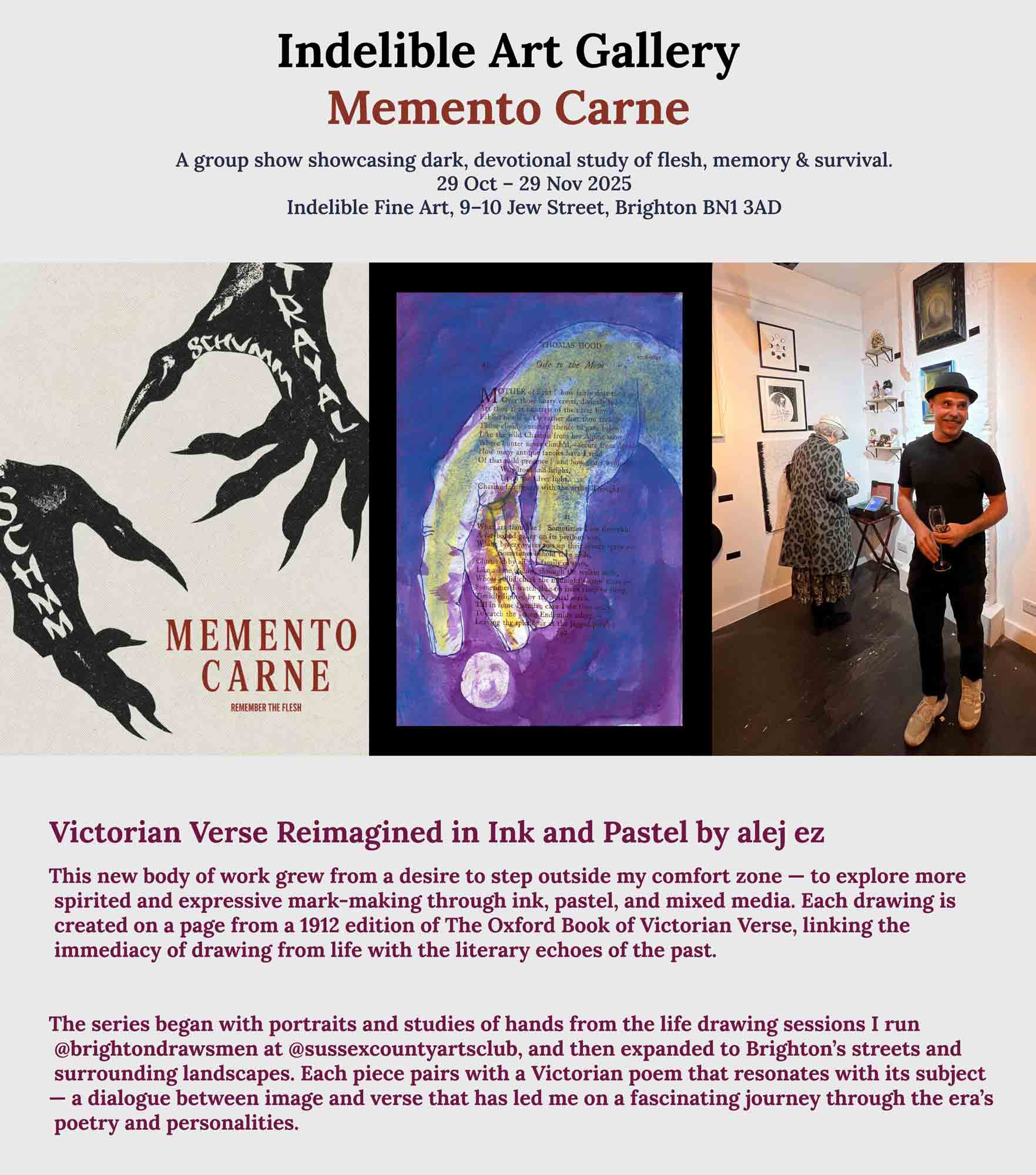Victorian Verse Reimagined in Ink and Pastel
🗓️ 29 Oct – 29 Nov 2025
📍 Indelible Fine Art, 9–10 Jew Street, Brighton BN1 3AD
I’m thrilled that @indeliblefineart, led by the formidable Kitty @alt.fits, has accepted my submission of fifteen drawings for the group exhibition Memento Carne.
This new body of work grew from a desire to step outside my comfort zone — to explore more spirited and expressive mark-making through ink, pastel, and mixed media. Each drawing is created on a page from a 1912 edition of The Oxford Book of Victorian Verse, linking the immediacy of drawing from life with the literary echoes of the past.
The series began with portraits and studies of hands from the life drawing sessions I run @brightondrawsmen at @sussexcountyartsclub, and then expanded to Brighton’s streets and surrounding landscapes. Each piece pairs with a Victorian poem that resonates with its subject — a dialogue between image and verse that has led me on a fascinating journey through the era’s poetry and personalities.
https://www.indeliblefineart.co.uk
Home

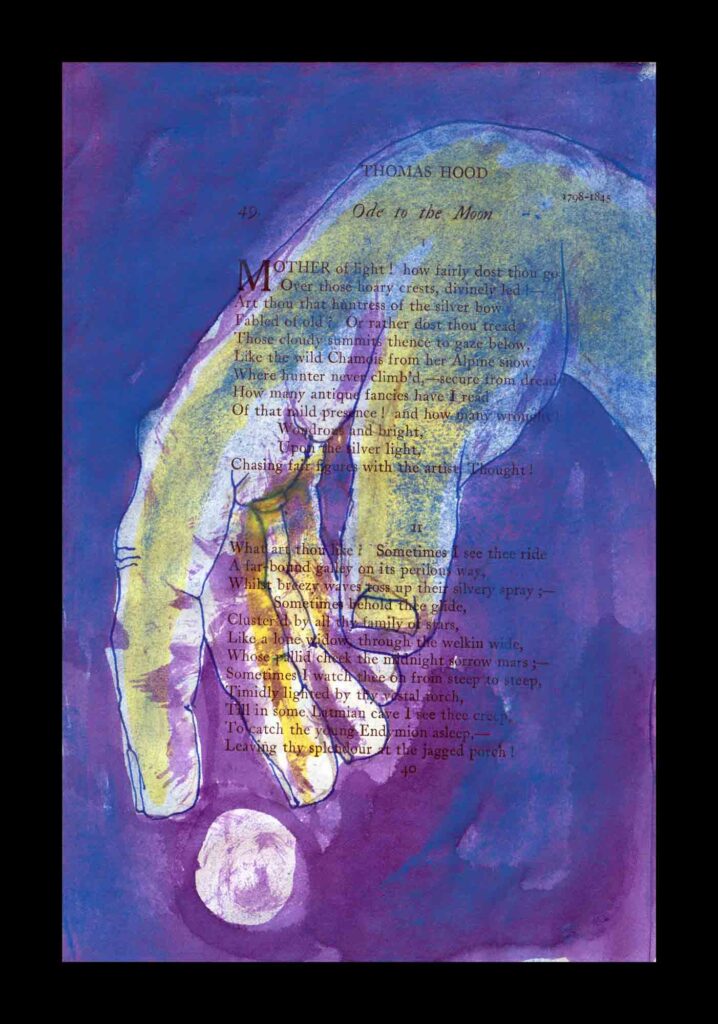
Mother of light! how fairly dost thou go
Over those hoary crests, divinely led!
— excerpt from “Ode to the Moon” by Thomas Hood
Cobalt and yellow ink, blue pastel, and pen on a page from The Oxford Book of Victorian Verse (1912).
From a life drawing session. Model: Ocean @conscious_euphoria
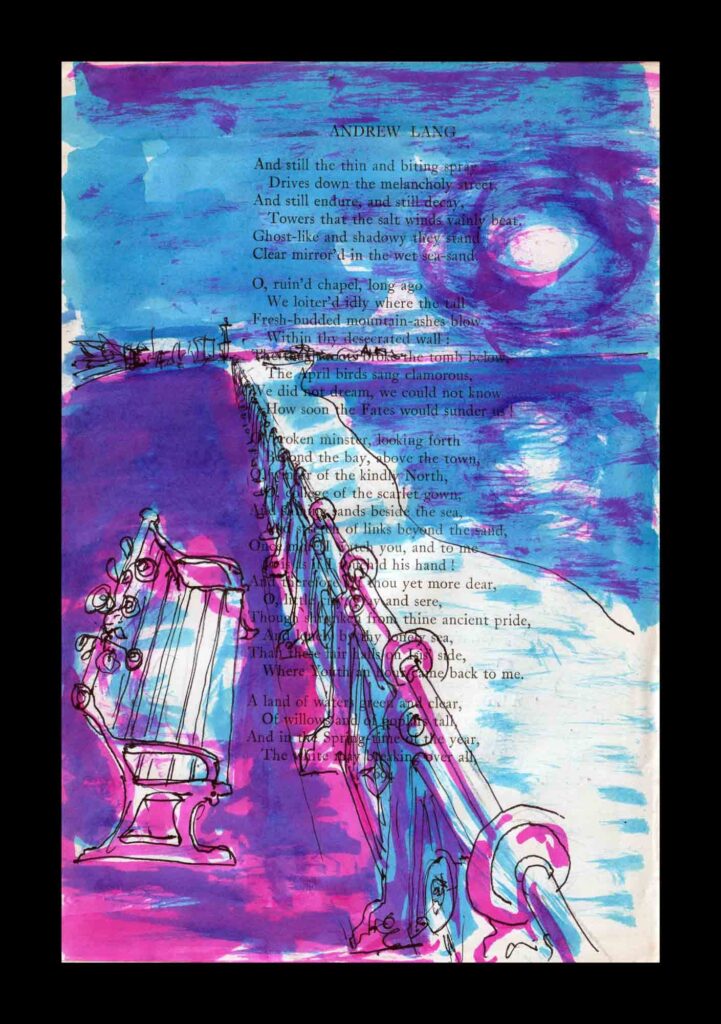
Brighton Bench and Railings alej ez Sept 2025
ANDREW LANG
And still the thin and biting spray
Drives down the melancholy bay,
And still endure and still obey
Towers that the sea-winds smite;
Obstinate and shadowy and grey,
Clear mirrored in the western bay
Clear mirrored in the western bay
O, ruin’d chapel, long ago
We loiter’d idly, where the snow
Fresh-budded mountain ashes blow
And the wild birds are tame;
The wood doves murmured soft and low,
The wood doves murmured soft and low
How soon the Fates would sunder two
Broken minds, looking forth
To the bitter sea, we two, from youth
And all the world, apart;
The shrill sea broke across the sand,
The shrill sea broke across the sand
And beat upon his hand
Who held you yet more dear,
More dear than the ancient pride,
The ancient pride, the ancient pride
Of name and race and land,
And brought you, weeping, back to me,
O willow boughs, O waving tree,
O waving tree, O waving tree
O harp of many a song.
Nature and the Sea: The “thin and biting spray,” “melancholy bay,” and “shrill sea” create a moody, windswept setting that mirrors the emotional tone.
Memory and Nostalgia: The speaker recalls a time spent at a “ruin’d chapel” and moments of intimacy and sorrow, suggesting a past love or deep connection.
Separation and Fate: Lines like “How soon the Fates would sunder two / Broken minds” hint at inevitable parting and emotional fragility.
Love and Devotion: The speaker values the beloved more than “ancient pride / Of name and race and land,” emphasizing personal connection over heritage or status.
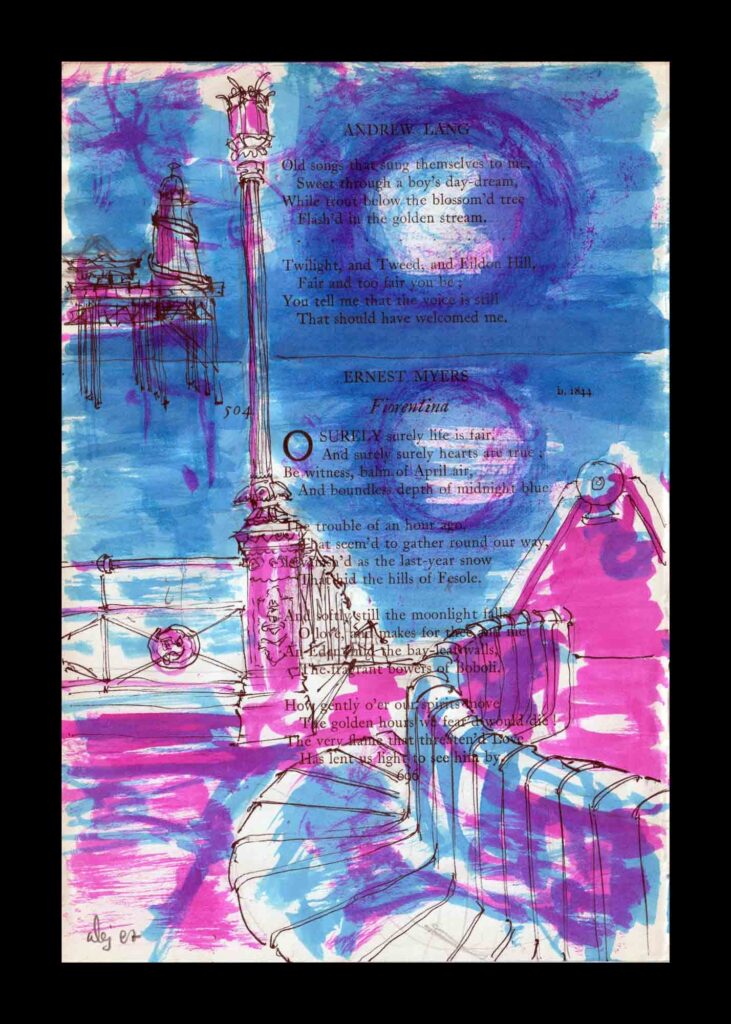
Brighton Groin Palace Pier Two alej ez Sept 2025
ANDREW LANG
Old songs that sung themselves to me,
Sweet through my boy’s day-dream,
When the hush fell below the blossom’d tree
Flash’d in the golden stream.
Twilight, and Tweed, and Till, and Hill,
Fair and too fair to last,
And the voice that woke the voice is still
That should have welcomed me.
ERNEST MYERS
Frommania
b. 1844
SURELY surely she is fair;
And surely surely hearts are kind
Where the houses climb Athos’ stair
And humbleness and peace of mind
Trouble of an honest race
Who with the last year’s snow
Came to the hills of Pegole.
And in the moonlight I
Watch the bay of Phormonia lie,
And the purple night is fair.
How faintly out of the darkness rings
The tender laugh, the beating bay.
A wistful reflection on memory and place, the poems evoke landscapes both real and imagined. They blend romantic nostalgia with lyrical impressions of twilight, sea, and distant hills.
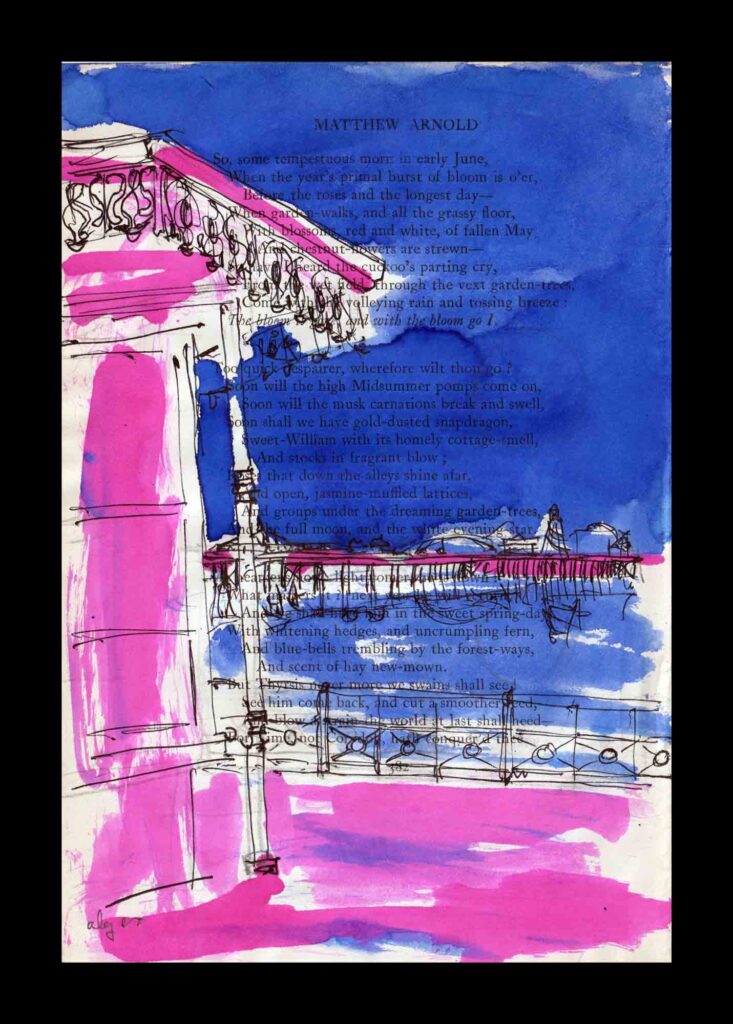
Brighton Seafron Kiosk alej ez Sept 2025
MATTHEW ARNOLD
So, some tempestuous morn in early June,
When the year’s primal burst of bloom is o’er,
Before the roses and the longest day—
When garden-walks and all the grassy floor
With blossoms red and white of fallen May,
And chestnut-flowers are strewn—
So have I heard the cuckoo’s parting cry,
From the wet field, through the vext garden-trees,
Come with the volleying rain and tossing breeze:
“The bloom is gone, and with the bloom go I!”
Too deep for June, ah, summer, wherefore wilt thou stay?
Bare is thy throne, the realm is empty grown
Of the calm daylight promise, once thy own!
Thy placid skies, thy lucid morning ray!
The rose is dying, the spring’s voice passed away!
A little while, and we have all things done—
Then comes thy unregarded end, and thou
Art old and blind and worn!
A poignant meditation on the fading beauty of summer, the poem mourns the passing of seasonal joy and youthful promise. Arnold’s imagery evokes nature’s quiet retreat and the melancholy of time slipping away.
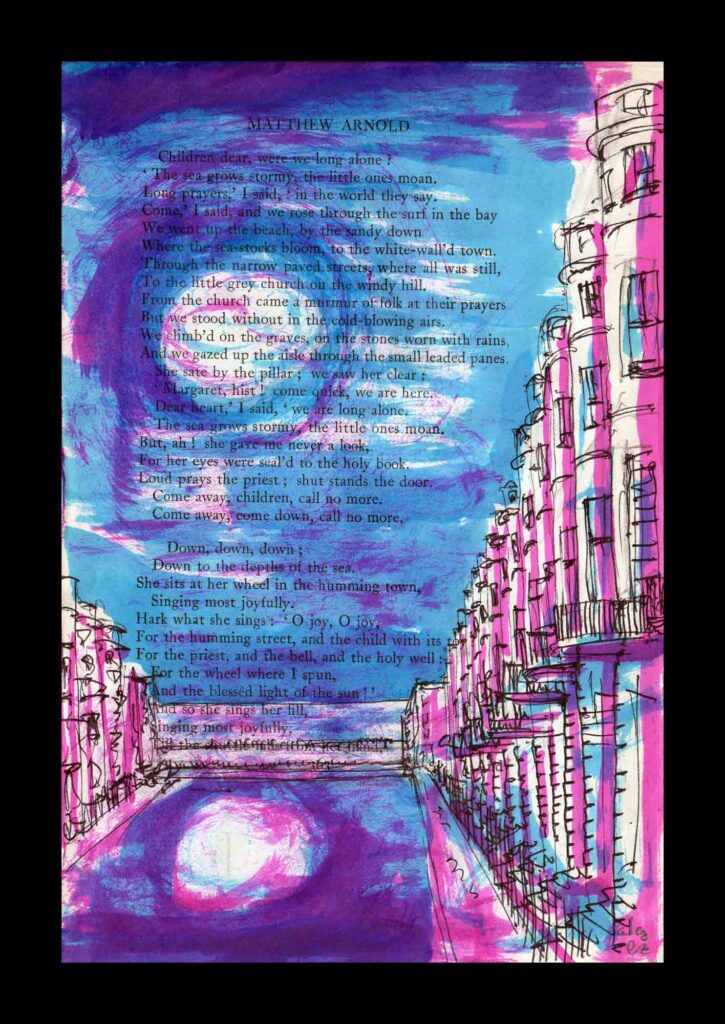
Brunswick Place and the Moon alej ez Sept 2025
MATTHEW ARNOLD
Children dear, was it long ago
That we used to run and shout,
Through the streets, stormy with noise, once more,
Lone prayers said, in the world they go,
And the sea is calm, and through the surf in the bay
Where the street ends, to the white-walled town.
Through the narrow streets, they wind,
Where the church comes into view—fold it their prayers
And the children come down, and all is still.
How we gazed up the aisle of the church with its rains,
And gazed up the aisle side, and the sunlight falls
Where the children come down, and all is still.
Children dear, was it long ago,
That we have a story? she little does moan.
Come away, come away to the holy book,
Lord prays the priest; and the hands are there.
Come away, children, all come too.
Come away, come down, all come too.
Down, down, down to the town,
Where the humming comes up.
She sings with hope in the humming town,
Singing with hope.
The white moon rises, O joy, O joy
For the humming street, and the child with its
Hands raised in the air, and the holy well is near.
And the blessed light of the sun,
And the blessed light of the sun,
And the blessed light of the sun.
A dreamlike reverie of childhood, prayer, and sacred light, this poem blends memory with spiritual imagery. Arnold evokes a quiet town where innocence and devotion shimmer beneath moon and sun.
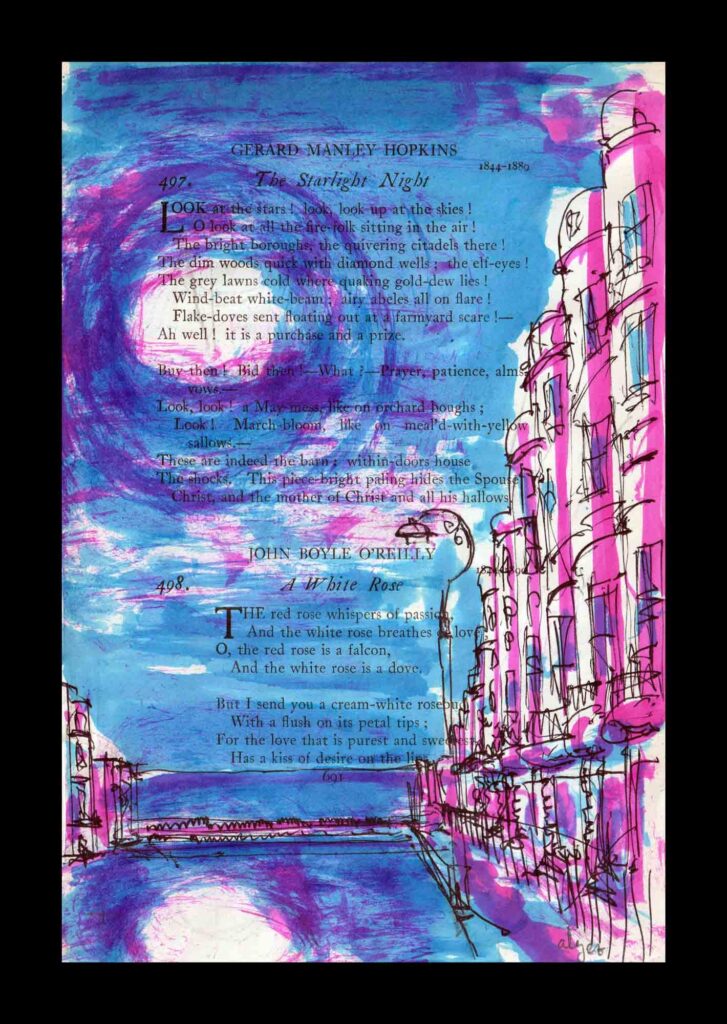
Brunswick Place and the Moon Two alej ez Sept 2025
407. Gerard Manley Hopkins (1844–1889)
The Starlight Night
Look at the stars! look, look up at the skies!
O look at all the fire-folk sitting in the air!
The bright boroughs, the circle-citadels there!
Down in dim woods the diamond delves! the elves’-eyes!
The grey lawns cold where gold, where quickgold lies!
Wind-beat whitebeam! airy abeles set on a flare!
Flake-doves sent floating forth at a farmyard scare!
Ah well! it is all a purchase, all is a prize.
Buy then! bid then! – What? – Prayer, patience, alms, vows.
Look, look: a May-mess, like on orchard boughs!
Look! March-bloom, like on mealed-with-yellow sallows!
These are indeed the barn; withindoors house
The sh… hallows.
408. John Boyle O’Reilly
A White Rose
The red rose whispers of passion,
And the white rose breathes of love;
O, the red rose is a falcon,
And the white rose is a dove.
But I send you a cream-white rosebud
With a flush on its petal tips;
For the love that is purest and sweetest
Has a kiss of desire on the lips.
Hopkins’s poem bursts with celestial wonder and spiritual symbolism, while O’Reilly’s tender verse contrasts fiery passion with gentle love through the metaphor of roses. Both celebrate beauty—one cosmic, one intimate.
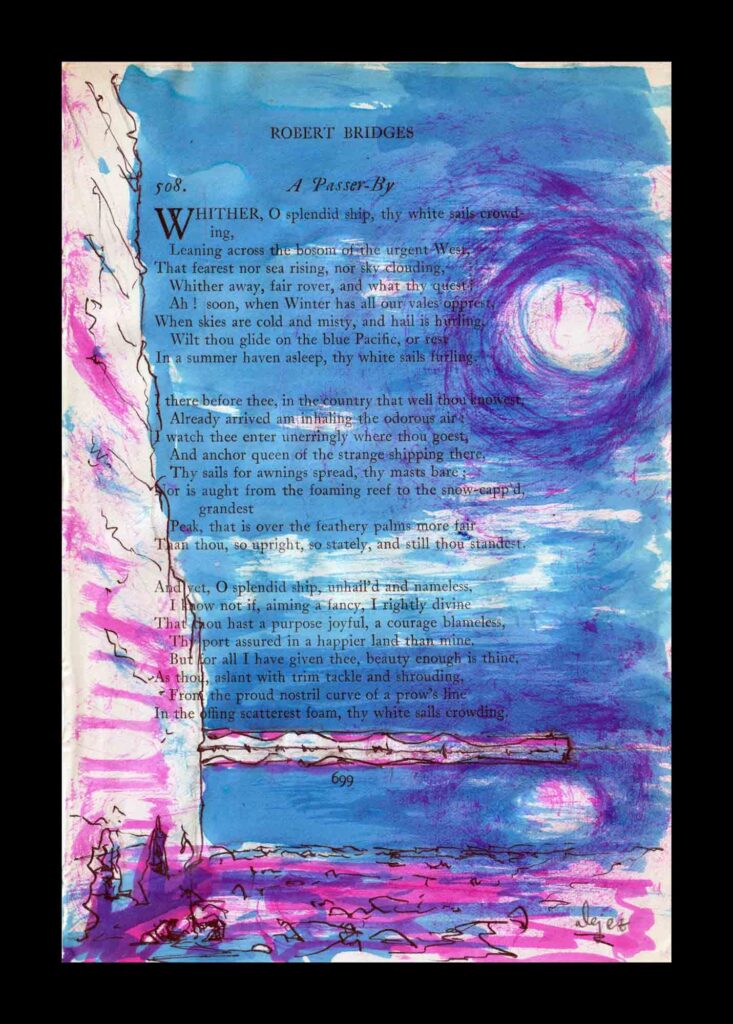
Cow Gap and the Moon alej ez Sept 2025
Robert Bridges
A Passer-By
(Page 508)
Whither, O splendid ship, thy white sails crowding,
Leaning across the bosom of the urgent West,
That fearest nor fair nor storm, but shod with fire,
And always ardent, always bright,
Thou goest thy way unwearing,
And day and night
Thy sails are filled with the eternal wind
That never rests, blowing the world’s desire
From land to land.
Ah! soon, when Winter has all our vales opprest
With silence and the snow, when skies are cold and mirth is choked with fear,
Thou wilt be with me, O my ship, my own!
In a summer haven asleep, thy white sails furling,
In the haven of my heart, asleep, my own!
Already arched with a burning odorous mist,
The crescent moon uplifts her shining shield,
While the near uncertainly white and half revealed
The glory of the evening star
Thy sails are fanning, as they pass
Through the darkening air.
Bridges’s poem paints a majestic vision of a ship sailing through time and memory, symbolizing longing and inner refuge. It blends maritime imagery with emotional depth, evoking both motion and stillness.
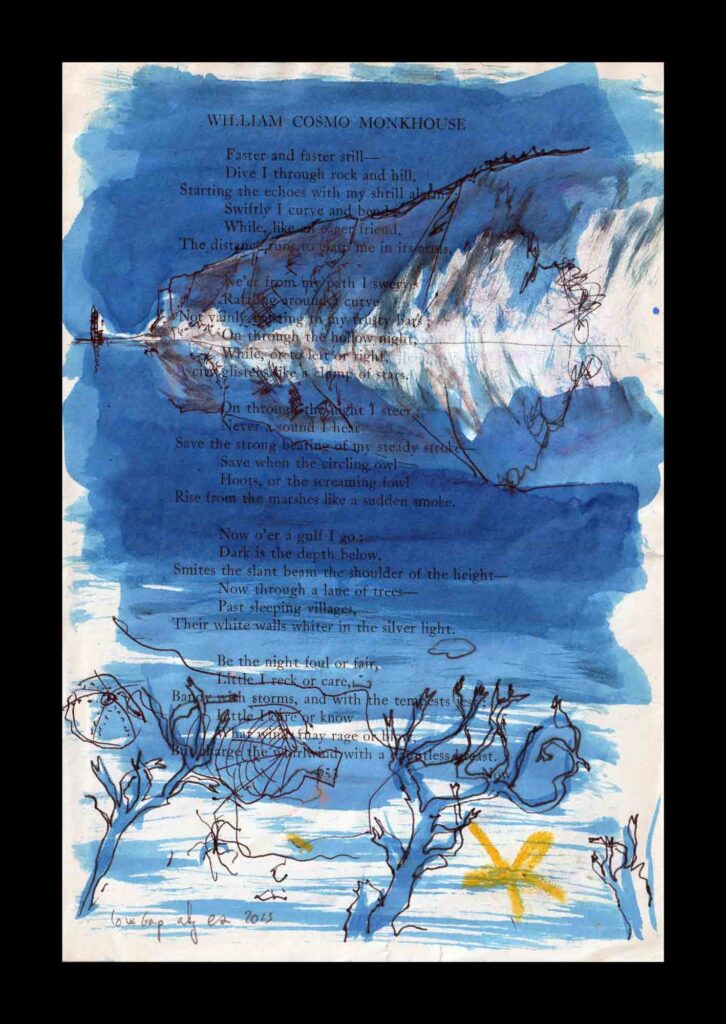
Cow Gap Beach alej ez Sept 2025
William Cosmo Monkhouse
Faster and still
Drive I through rock and hill,
Starting the echoes with my shrill
Whistle, long and loud.
While like a flag unfurled
Smoke streams behind me, floating far
Over the steaming rails and scar
Of the black, dusty world.
Faster and still
Drive I through rock and hill,
Over the vale, and up the height,
Through the darkness and the light,
Through the tunnel I race—
Never slackening my pace—
Over the swinging bridge of my steady track—
See the towns flashing by—
Hooting, or the screaming bell
Rise from the marbles like a sudden smoke.
Now o’er a gulf I go,
Dark in the depth below,
Smites the bare beam the shoulder of the height.
Now through a lane of trees
Past pleasant villages I flee—
Their white walls whiter in the silver light.
Be the might for toil or ease,
Their rock of care,
Their hail, storms, and wind.
Monkhouse’s poem captures the relentless energy of a train racing through landscapes, blending industrial power with lyrical motion. It evokes speed, sound, and the contrast between nature and machine.
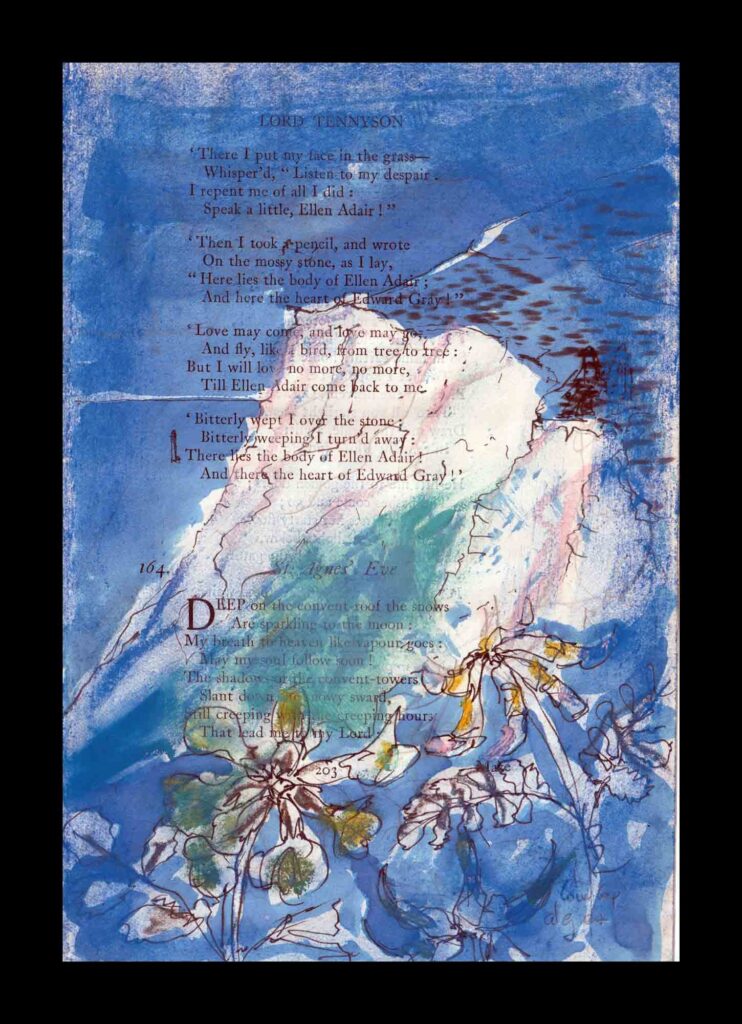
Cow Gap Cliff and Field alej ez Sept 2025
Lord Tennyson
(Excerpt featuring Ellen Adair and Edward Gray)
1
“She must be fond of the grass—
Whisper’d I, ‘Listen to my despair;
I repent me of all I did:
Speak a little, Ellen Adair!’
2
Then I took up a pen, and wrote
On the mossy bank, to say,
‘Here lies the body of Ellen Adair’;
And here the heart of Edward Gray.
3
Love may come, and love may go,
And fly like a bird from tree to tree;
But I will love no more, no more,
Till Ellen Adair come back to me.
4
Bitterly wept I over the stone,
Bitterly weeping I turn’d away,
‘There lies the body of Ellen Adair’;
And here the heart of Edward Gray.
5
Deep in the convent of the west
She is buried from day to day;
Ellen Adair! oh, Ellen Adair!
And here the heart of Edward Gray.
6
Love may come, and love may go,
And fly like a bird from tree to tree;
But I will love no more, no more,
Till Ellen Adair come back to me.
This mournful poem tells of Edward Gray’s undying love for Ellen Adair, whose death leaves him heartbroken and devoted beyond hope. Tennyson weaves grief and romantic fidelity into a haunting refrain
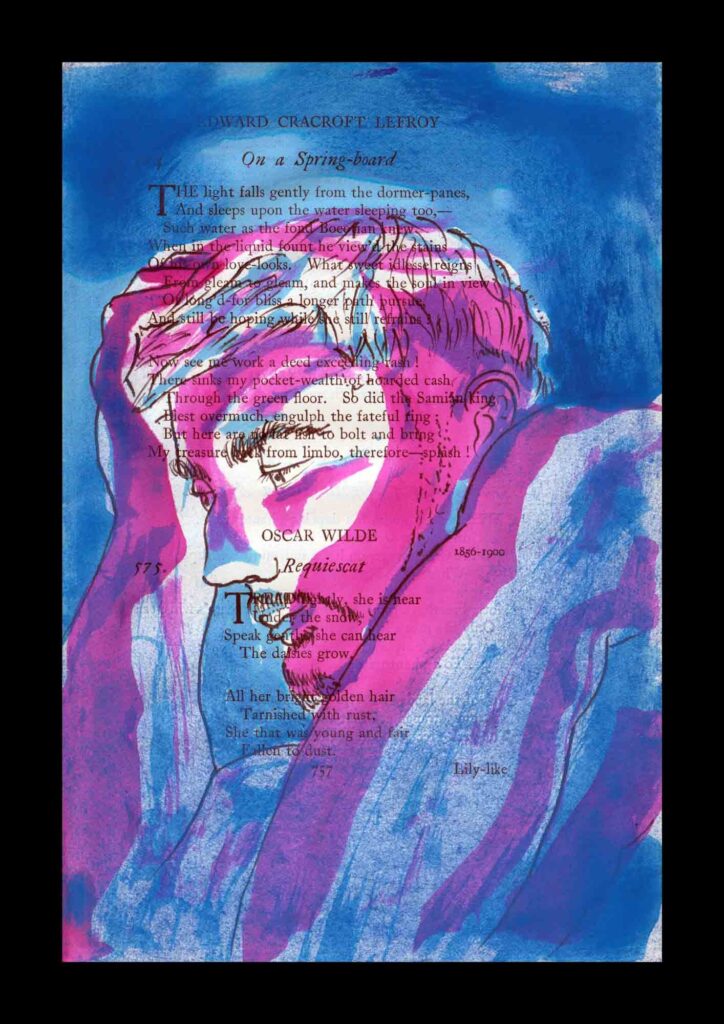
Ocean Pensive Scarlet alej ez Sept 2025
Edward Cracroft Lefroy
On a Spring-board
The light falls gently from the dormer panes,
And sleeps upon the water sleeping too.
Such water! where it lies, a lucent floor
Unruffled, where the slow clouds drift and go
Like silent shadows. Where the lilies blow
And all the air is odorous with their breath.
And I lie here, a cloud upon the stream,
A dream upon the water, and a dream
Within my heart, a cloud within my brain.
See! in my pocket—wetted with cool hands
Through the green reeds—did the Samian find
His cup, even through the fateful ring
That ever widened from the water’s spring
And reached from limbo, there to touch the rim.
Oscar Wilde (1856–1900)
Requiescat
Tread lightly, she is near
Under the snow,
Speak gently, she can hear
The daisies grow.
All her bright golden hair
Tarnished with rust,
She that was young and fair
Fallen to dust.
Lily-like…
Lefroy’s poem drifts through dreamy reflections on water and memory, while Wilde’s elegy mourns a lost beloved with delicate restraint. Both pieces evoke quiet reverence and emotional depth.
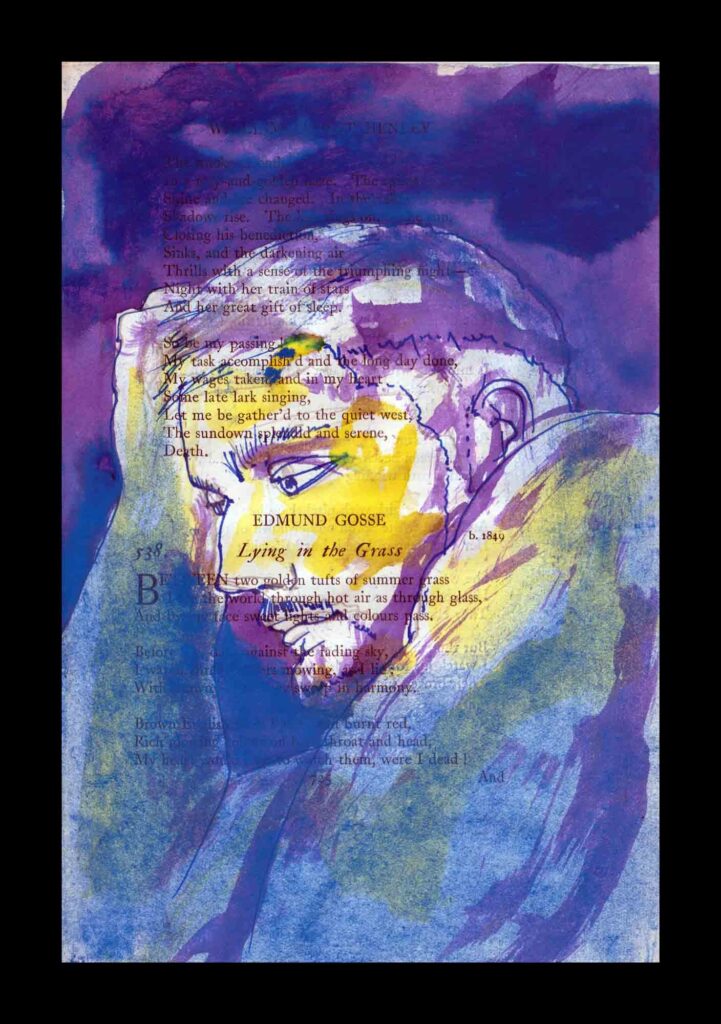
Ocean Pensive Yellow alej ez Sept 2025
Edmund Gosse
Lying in the Grass
b. 1849
Two sudden tufts of summer grass
Against the glass.
A cloudless sky; a world of blue;
The air holds nothing false nor new.
The bees are busy in the clover,
The butterflies drift idly over.
The poppies flame, the daisies stare,
The green earth basks in the sunlit air.
And I, supine, with half-shut eyes,
Feel the warm hush of paradise.
The wind is still, the world is deep,
And all the flowers seem fast asleep.
I hear the linnet’s drowsy tune
And watch the shadows shift at noon.
The grass is cool beneath my head,
The sky is wide, the hours are fled.
And in this moment, rich and rare,
I lose all thought of pain or care.
Gosse’s poem captures a tranquil moment of immersion in nature, where time slows and the senses awaken. It’s a gentle meditation on peace, presence, and the beauty of stillness.
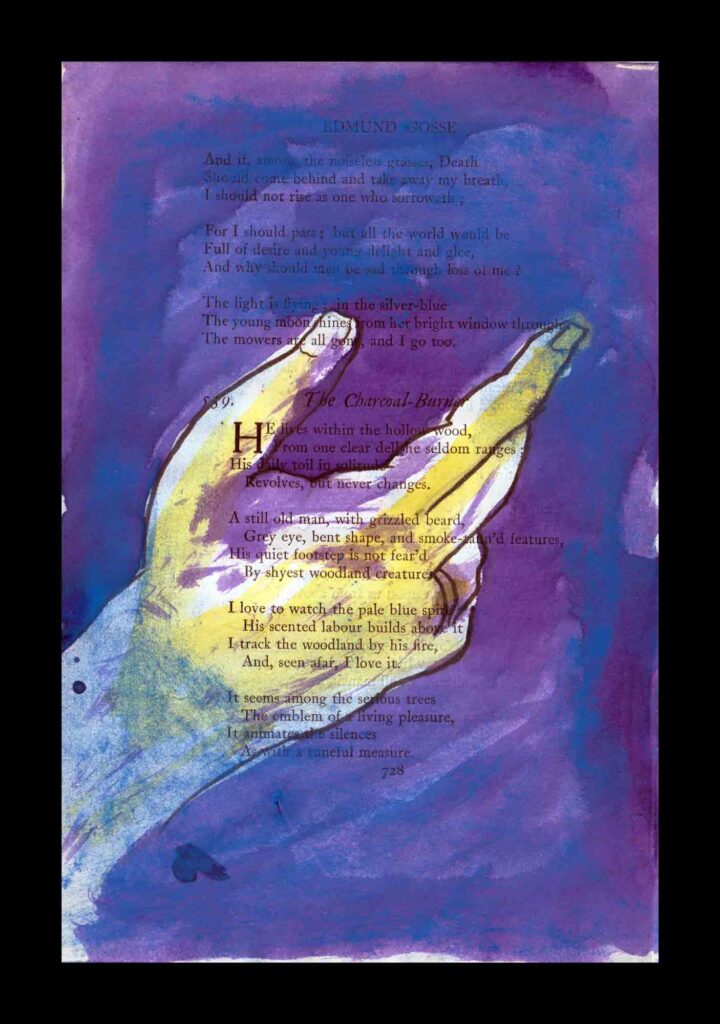
Oceans Hand Offering alej ez Sept 2025
Edmund Gosse
And if, among the noblest essays, Death
Should glance behind and take away my breath,
I should not care for one who sorroweth.
For I should pass—but all the world would see
Full of desire and your delightful soul,
And the young morning in the woods to me?
The lights flying in the silver-blue,
The young motion in the bright window thrown,
The mowers all a-mowing in the dew.
The Charcoal Burner
(Poem 56)
He lives within the hollow wood,
From one clear dell he seldom ranges;
He has no need of human food,
He eats the moss, and lives on changes.
Revolves, and never changes.
A still old man, with knitted beard,
Grey eye, bent shape, and smoke-wreathed features,
His strict footpoint is not feared
By wildwood beast or creature.
I love to watch the pale blue rise,
His scented blaze builds high;
I track the woodland by his fire,
And, secular, lose its cry.
It seems among the young trees
An emblem of undying pleasure,
It warms the silence, and agrees
With a funeral measure.
Gosse’s verse reflects on mortality and the enduring beauty of life, while “The Charcoal Burner” portrays a solitary figure in nature, whose quiet presence evokes timelessness and mystery. Both pieces explore the tension between transience and permanence.
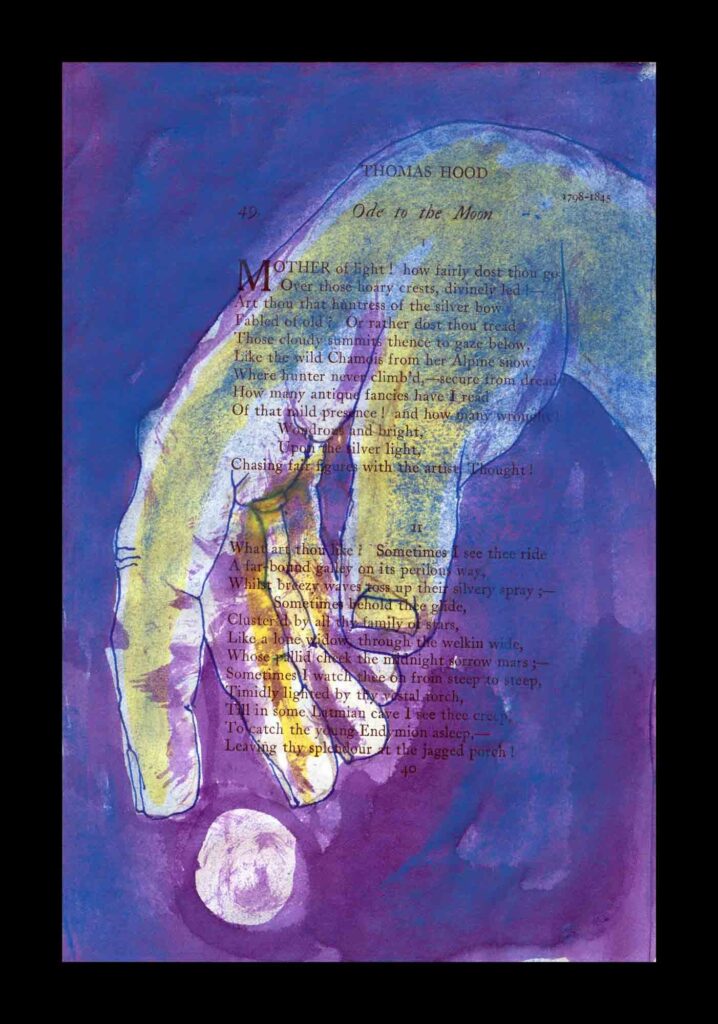
Oceans Hand Pointing Down alej ez Sept 2025
Thomas Hood (1798–1845)
Ode to the Moon
Mother of light! how fairly dost thou go
Over those hoary steeps, seraphic led!
Climb clouded Olympus, and the deep below,
Like a pale ghost driven from the shore,
Like the wild chamois from her Alpine snow,
And the blue crags of ice!
How many a cloud
Has hung its misty shroud
Upon thy face, and flung its shade around!
How many an angel hath seen thee ride
On the silver tide
Of that wild province of the sky,—
Thy own domain of light!
Chastised by the winds, and thought!
Sometimes see thee ride
Like a white spirit through the waking wide,
Climb the blue steep of heaven, and from steep to steep,
Leave thy bright path on the jagged peak!
Hood’s ode reveres the moon as a celestial wanderer, weaving through clouds and peaks with ghostly grace. His imagery blends myth, nature, and awe into a luminous tribute to night’s queen.
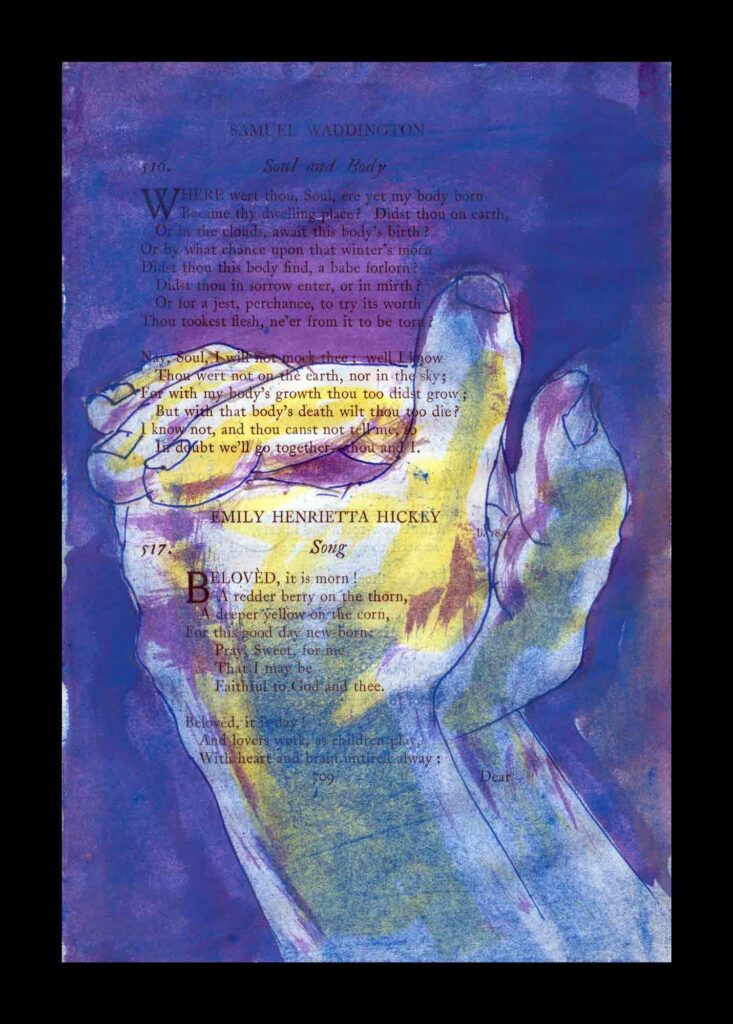
Oceans Hands Clasped alej ez Sept 2025
516. Samuel Waddington
Soul and Body
Where wert thou, Soul, ere yet my body born
Became thy dwelling-place? Didst thou on earth,
Or in the clouds, await this body’s birth?
Or why that change upon that mystic morn?
Didst thou not find a home in life forlorn,
Didst thou in man enter, or in the worm,
Or for a jest, come, only to its worth
Thou tookest flesh, before it was outworn?
517. Emily Henrietta Hickey
Song
Beloved, it is morn!
Red rose upon the berry,
The corn is golden in the ear,
The birds sing in the cherry.
Sweet love, it is morn!
The world is all new-born;
The world is made for lovers,
For lovers, for lovers!
Beloved, it is morn!
I call to God and thee.
Waddington’s poem contemplates the mystery of the soul’s origin and its union with the body, while Hickey’s lyrical “Song” celebrates morning as a divine moment of love and renewal. Together, they explore spiritual presence and earthly joy.
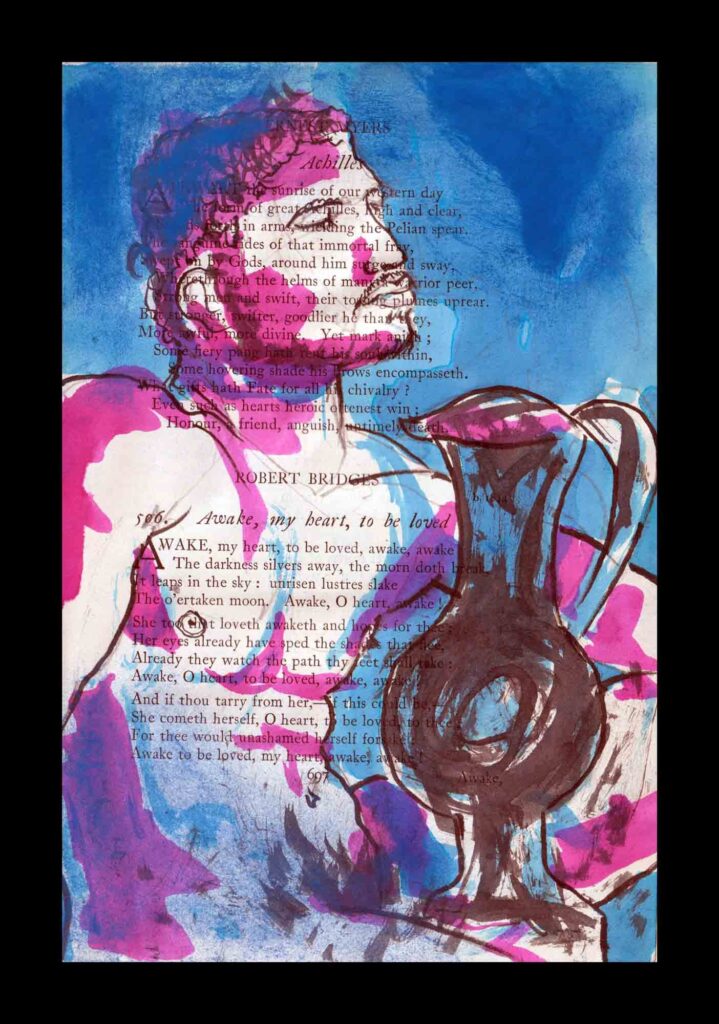
Tom and Vase alej ez Sept 2025
Robert Bridges
586. Awake, my heart, to be loved
Awake, my heart, to be loved, awake, awake!
The darkness silvers away, the morn doth break,
It glimmers in the sky: unseal thine eyes,
See, all things are alert for thee arise!
The yearning birds are awake on every bough,
The wandering beasts are stirring, and thou?
She waketh too, whose voice then didst know
Heaven’s messenger, the spring is here, arise!
And if thou tarry from her, if this could be,
She waketh and saith, “Who is there that calleth me?”
Her eyes are open, her arms await,
For thee the world is ashamed to wait, awake!
Awake to be loved, my heart, awake!
Bridges’ lyrical call to awaken celebrates the arrival of spring and love, urging the heart to rise with the world’s renewal. The poem blends romantic longing with nature’s vibrant awakening.
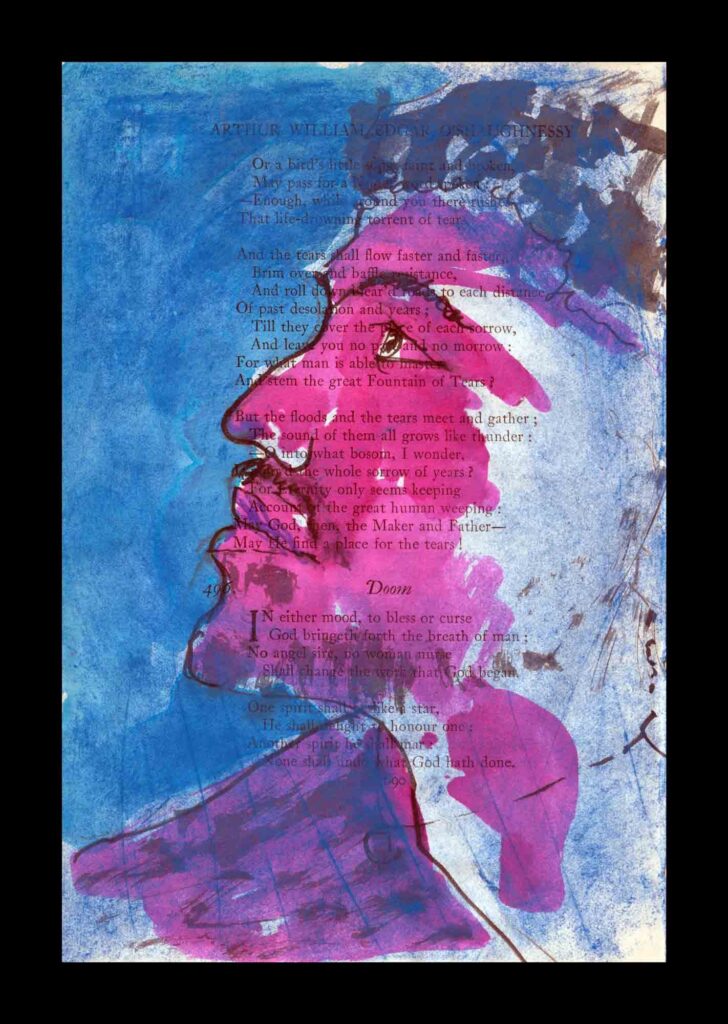
Tom Profile alej ez Sept 2025
Arthur William Edgar O’Shaughnessy
Doom
Or a bird lifted up on the wind,
May pass with the wind away;
Enough if the wind be strong to bear it—
The wind is the portent of death!
And the torrent shall flow faster and faster,
Born not of a lasting fountain,
And roll on with a headlong haste
Of past doom and a certain ending.
Still they flow on, these torrents of sorrow,
And they never look to the morrow;
For man is able to move them,
As from the great Fountain of Tears.
But the floods and the tears meet and gather;
And most of them all grieves the thunder
Of the whole sweet world of years;
And the great human woe
May cry out to the Maker and Father—
May cry to the place for the seal—
Doom
In either mood, to bless or curse
None bringeth forth the breath of man,
Nor stayeth the soul in its course,
Nor lifteth the soul again.
Shall the whole race start,
The whole race rise and fall,
And nothing of all that God hath done,
Abide rising up from God hath done.
O’Shaughnessy’s “Doom” contemplates the inevitability of fate and the futility of human sorrow against divine judgment. It’s a sweeping meditation on mortality, cosmic justice, and the silence of God.

